8B Unit5 Revision
牛津英语8Bunit5-8短语句型默写(教育材料)

8B U5短语1 插话2 仍垃圾3 保持安静4 摘花5 保持图书馆干净6 握某人的手7 在公开场合8 插队9 挡路10 打扰了11 也,以及,和12偶然地13 使每个人发笑14 她独自一人15 加入讨论16 清晰地表达自己17 所有要点18 忙于(某事)19 使某人免遭(危险)20 警告某人不要做21 不久以后22 演讲的目的23 制造太多噪音24 越过某人的盘子伸手够...25 首先句子:1 你够大了,可以了解一些礼仪了。
You’re _______ ________ ______ learn about manners now.2 活到老,学到老。
You are ______ _______ _____ _____ learn..3 不要到处扔垃圾。
Don’t _____ _______ everywhere.4 和人打招呼的正确方法是什么?What’s the ______ ______ _____ ______peopple there?5 英国人只是和亲戚或者密友打招呼时用亲吻的方式。
British people only________ relatives or close friends _________ _____ ______.6 他们会说“打扰了”并且足够礼貌地等待直到你移走。
They’ll say ________ _______ and be ________ _________to wait _______ you move.7 英国人太礼貌了,他们从来不在公共场合大声喊叫。
British people are ______ __________ _____ _______ loudly _______ ________.8 英国太远了,Jenny独自去不了。
The UK is _____ ______ ______ Jenny ____ go to ________ _______ _______.9 英译汉(1) The early bird catches the worm.(2) It never rains but it pours.(3) Many hands make light work.(4) Every dog has its day.(5) Put all your eggs in one basket.(6) The grass is always greener on the other side.(7) Actions speak louder than words.(8) No pain, no gain.(9) A friend in need is a friend indeed.(10) Practice maks perfect.(11) You can’t burn the candle at both ends.10 演讲的目的是教学生们吃的规则。
牛津英语8bunit5checkout学案及教案
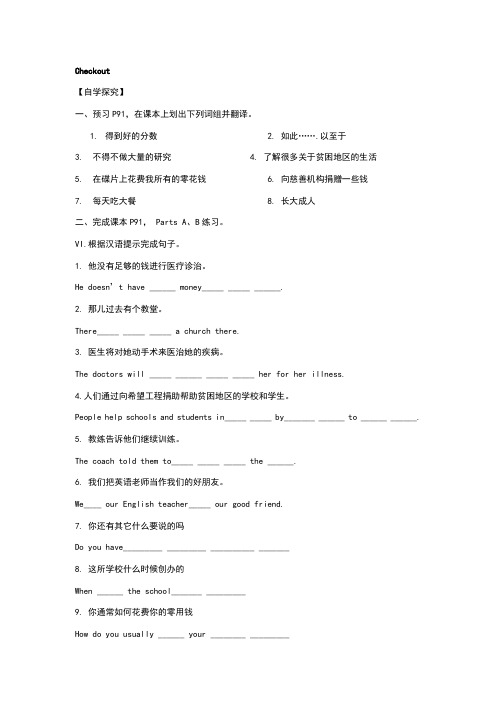
Checkout【自学探究】一、预习P91,在课本上划出下列词组并翻译。
1.得到好的分数2. 如此…….以至于3. 不得不做大量的研究4. 了解很多关于贫困地区的生活5. 在碟片上花费我所有的零花钱6. 向慈善机构捐赠一些钱7. 每天吃大餐8. 长大成人二、完成课本P91, Parts A、B练习。
VI.根据汉语提示完成句子。
1. 他没有足够的钱进行医疗诊治。
He doesn’t have ______ money_____ _____ ______.2. 那儿过去有个教堂。
There_____ _____ _____ a church there.3. 医生将对她动手术来医治她的疾病。
The doctors will _____ ______ _____ _____ her for her illness.4.人们通过向希望工程捐助帮助贫困地区的学校和学生。
People help schools and students in_____ _____ by_______ ______ to ______ ______.5. 教练告诉他们继续训练。
The coach told them to_____ _____ _____ the ______.6. 我们把英语老师当作我们的好朋友。
We____ our English teacher_____ our good friend.7. 你还有其它什么要说的吗Do you have_________ _________ __________ _______8. 这所学校什么时候创办的When ______ the school_______ _________9. 你通常如何花费你的零用钱How do you usually ______ your ________ _________10. 她只想着自己,从不关心他人。
She only_____ _______ herself and doesn’t________ ___________ others.【教案】【当堂巩固】一、A. 根据句意和所给中文写出句中所缺的单词。
牛津英语8B Unit5单元中考复习学案(有答案))
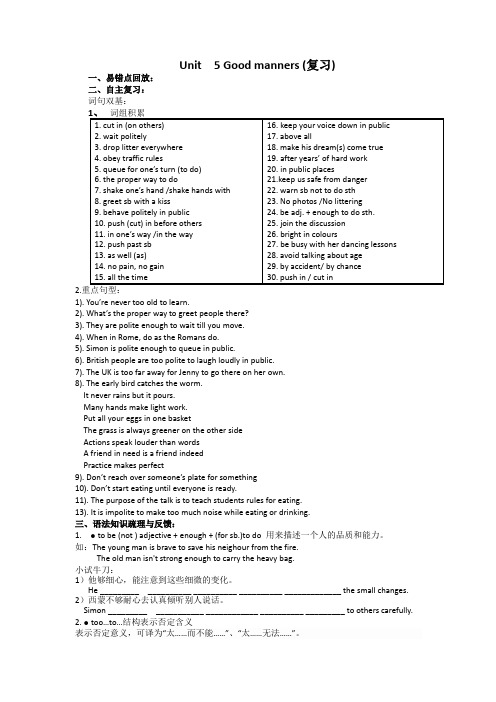
Unit 5 Good manners (复习)一、易错点回放:二、自主复习:词句双基:2.1). You’re never too old to learn.2). What’s the proper way to greet people there?3). They are polite enough to wait till you move.4). When in Rome, do as the Romans do.5). Simon is polite enough to queue in public.6). British people are too polite to laugh loudly in public.7). The UK is too far away for Jenny to go there on her own.8). The early bird catches the worm.It never rains but it pours.Many hands make light work.Put all your eggs in one basketThe grass is always greener on the other sideActions speak louder than wordsA friend in need is a friend indeedPractice makes perfect9). Don’t reach over someone’s plate for something10). Don’t start eating until everyone is ready.11). The purpose of the talk is to teach students rules for eating.13). It is impolite to make too much noise while eating or drinking.三、语法知识疏理与反馈:1. ● to be (not ) adjective + enough + (for sb.)to do 用来描述一个人的品质和能力。
江苏牛津版英语8B Unit 5知识点整理.doc
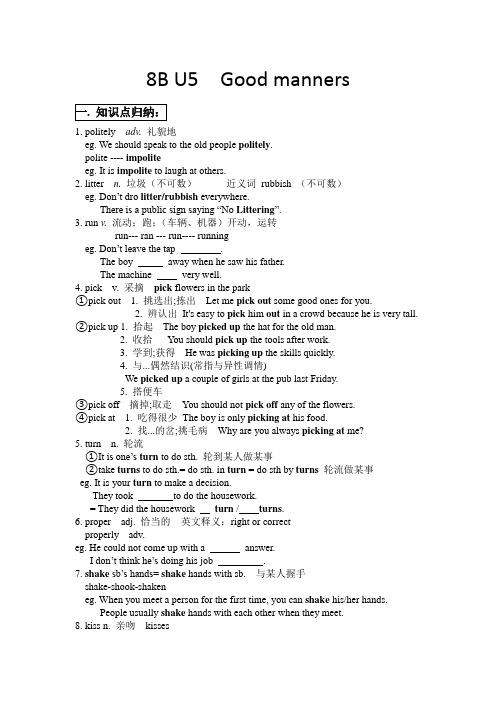
8B U5 Good manners1. politely adv.礼貌地eg. We should speak to the old people politely.polite ---- impoliteeg. It is impolite to laugh at others.2. litter n.垃圾(不可数)近义词rubbish (不可数)eg. Don’t dro litter/rubbish everywhere.There is a public sign saying “No Littering”.3. run v.流动;跑;(车辆、机器)开动,运转run--- ran --- run---- runningeg. Don’t leave the tap.The boy away when he saw his father.The machine very well.4. pick v. 采摘pick flowers in the park①pick out 1. 挑选出;拣出Let me pick out some good ones for you.2. 辨认出It's easy to pick him out in a crowd because he is very tall.②pick up 1. 拾起The boy picked up the hat for the old man.2. 收拾You should pick up the tools after work.3. 学到;获得He was picking up the skills quickly.4. 与...偶然结识(常指与异性调情)We picked up a couple of girls at the pub last Friday.5. 搭便车③pick off 摘掉;取走You should not pick off any of the flowers.④pick at 1. 吃得很少The boy is only picking at his food.2. 找...的岔;挑毛病Why are you always picking at me?5. turn n. 轮流①It is one’s turn to do sth. 轮到某人做某事②take turns to do sth.= do sth. in turn = do sth by turns轮流做某事eg. It is your turn to make a decision.They took to do the housework.= They did the housework turn / turns.6. proper adj. 恰当的英文释义:right or correctproperly adv.eg. He could not come up with a answer.I don’t think he’s doing his job.7. shake sb’s hands= shake hands with sb. 与某人握手shake-shook-shakeneg. When you meet a person for the first time, you can shake his/her hands.People usually shake hands with each other when they meet.8. kiss n. 亲吻kissescut in (on sb/sth)插嘴Don't cut in on your mother when she is speaking. Don't cut in on other people's conversation③push off 出发The team pushed off before dawn.④push along= push ahead [forward/on]奋力前进; 抓紧进行15. in one’s/the way 挡某人路eg. You will have to move – you are in my way.[拓展]① in a /some way 在某种程度上②by the way 顺便说一句By the way, how are your grandparents?eg. She watched TV until/till her mother came back. 她一直在看电视,直到她母亲回来。
8B Unit5 复习讲义 2
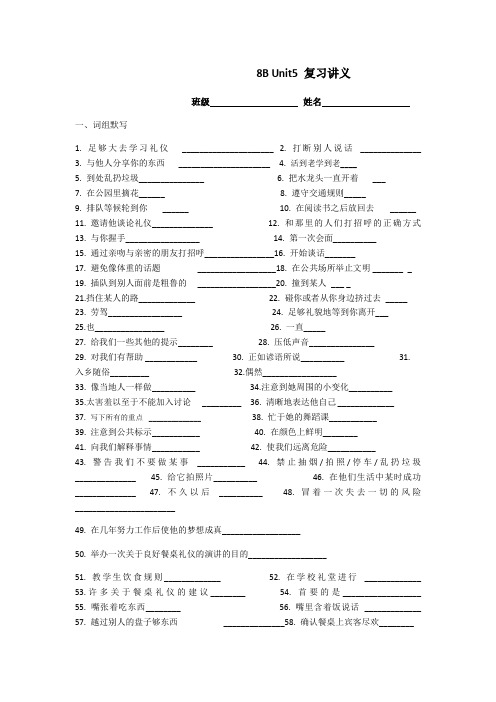
8B Unit5 复习讲义班级姓名一、词组默写1. 足够大去学习礼仪_____________________2. 打断别人说话______________3. 与他人分享你的东西_____________________4. 活到老学到老____5. 到处乱扔垃圾_______________6. 把水龙头一直开着___7. 在公园里摘花______ 8. 遵守交通规则_____9. 排队等候轮到你______ 10. 在阅读书之后放回去______ 11. 邀请他谈论礼仪______________ 12. 和那里的人们打招呼的正确方式13. 与你握手_________________ 14. 第一次会面__________15. 通过亲吻与亲密的朋友打招呼________________16. 开始谈话_______17. 避免像体重的话题__________________18. 在公共场所举止文明 _______ _ 19. 插队到别人面前是粗鲁的__________________20. 撞到某人___ _21.挡住某人的路_____________ 22. 碰你或者从你身边挤过去_____ 23. 劳驾_________________ 24. 足够礼貌地等到你离开___25.也________________ 26. 一直_____27. 给我们一些其他的提示________ 28. 压低声音_______________29. 对我们有帮助 ____________ 30. 正如谚语所说__________ 31.入乡随俗_________ 32.偶然_________________33. 像当地人一样做__________ 34.注意到她周围的小变化__________35.太害羞以至于不能加入讨论_________ 36. 清晰地表达他自己 _____________37. 写下所有的重点______________ 38. 忙于她的舞蹈课___________39. 注意到公共标示___________ 40. 在颜色上鲜明________41. 向我们解释事情___________ 42. 使我们远离危险___________43. 警告我们不要做某事___________ 44. 禁止抽烟/拍照/停车/乱扔垃圾______________ 45. 给它拍照片__________ 46. 在他们生活中某时成功______________ 47. 不久以后__________ 48. 冒着一次失去一切的风险_______________________49. 在几年努力工作后使他的梦想成真__________________50. 举办一次关于良好餐桌礼仪的演讲的目的__________________51. 教学生饮食规则_____________ 52. 在学校礼堂进行_____________ 53.许多关于餐桌礼仪的建议________ 54. 首要的是__________________ 55. 嘴张着吃东西________ 56. 嘴里含着饭说话_____________ 57. 越过别人的盘子够东西______________58. 确认餐桌上宾客尽欢________二、单项选择1.---Would you mind ______ me to carry all the books --- _______ . I will do it right now.A.to help; Yes, I doB. to help; Of course notC. helping; Of courseD. helping; Not at all2.&3.The small mouse lived in a _______ hole _____ , but it never felt ______.A alone; alone; lonelyB lonely; lonely; aloneC lonely ; alone; lonelyD alone; lonely; alone4.I have been in the famous city for ____. I will go to another _______ next month.A . sometime; sometimeB sometimes; some timeC some time; sometimeD some times;some time5._______ to school, I found a very huge rock _______.A In my way; on the wayB on the way to; in my wayC on the way; In my wayD in my way to;on the way6.Simon is ______ impatient _______ listen carefully to my question.A so; thatB too; toC / ; enough toD enough; to7.---We’re going to ______ a talk tomorrow. --- But where will the talk _______A hold; holdB take place; take placeC hold; take placeD take place; hold8.:9.It was raining heavily. Lucy felt cold, so she stood ______ to her mother.A closeB closelyC closedD closing10.I’d like to buy a big and modern house. ________ , I hope it’s in a quiet neighborhood.A.After allB. above all C As a result D at that moment11.--- Where is Mr. Green I haven’t seen him for a few He has ____ HK. He won’t be back ___next week.A gone to; afterB been to; untilC gone to ; untilD been to; after12.The flat is _______ small for all of us _______.A so; to live inB too; to liveC to; to live inD so; to live13.If you want to be ______, you’d better take _______ .A healthy enough; enough exerciseB enough healthy; exercise enough/C healthy enough ; enough exercisesD enough healthy; exercises enough14.Volunteers make the meeting _____ by _______ .A a success; hard-workingB success; working hardC successful; working hardD asuccess; working hard15.If you go to Tom’s birthday party, I ______ go _______.A /; tooB won’t; eitherC do; as well asD will; as well16.There are no _______ for behavior like that. He’s very rude.A wayB whyC excusesD excuse17.The local people warned them ______ in such bad conditions.A not risk travellingB not to risk travellingC not risking to travelD not to risk to travel18.--- What do you think of summer in Nanjing --- Well, it’s sometimes ______ hot andsometimes there is _____ rain.[A too much; much tooB too much; too muchC much too ; much tooD much too; too much19.John was too excited to ______ us what happened _____ him.A talk; onB say; onC tell; toD speak; to20.This is the best way I could think of _____ him ______ computer games.A to stop; playingB stopping; playingC to stop; to playD stopping; to play21.______ . You should work hard to enter a good college.A Burn the candle at both sidesB Actions speak louder than words.C No pain, no gainD Every dog has its day22.--- Did you bring any books here ---Yes, I bought ____ here, but I can’t find ____ now.A one; oneB it; itC one; itD it; one。
牛津英语8B UNIT5‘Welcome to the unit’(初二下)
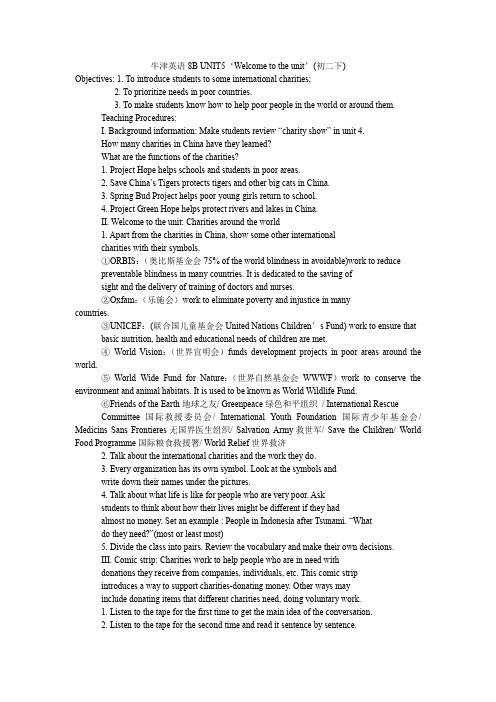
牛津英语8B UNIT5‘Welcome to the unit’(初二下)Objectives: 1. To introduce students to some international charities;2. To prioritize needs in poor countries.3. To make students know how to help poor people in the world or around them.Teaching Procedures:I. Background information: Make students review “charity show” in unit 4.How many charities in China have they learned?What are the functions of the charities?1. Project Hope helps schools and students in poor areas.2. Save China’s Tigers protects tigers and other big cats in China.3. Spring Bud Project helps poor young girls return to school.4. Project Green Hope helps protect rivers and lakes in China.II. Welcome to the unit: Charities around the world1. Apart from the charities in China, show some other internationalcharities with their symbols.①ORBIS:(奥比斯基金会75% of the world blindness in avoidable)work to reducepreventable blindness in many countries. It is dedicated to the saving ofsight and the delivery of training of doctors and nurses.②Oxfam:(乐施会)work to eliminate poverty and injustice in manycountries.③UNICEF:(联合国儿童基金会United Nations Children’s Fund) work to ensure thatbasic nutrition, health and educational needs of children are met.④World Vision:(世界宣明会)funds development projects in poor areas around the world.⑤World Wide Fund for Nature:(世界自然基金会WWWF)work to conserve the environment and animal habitats. It is used to be known as World Wildlife Fund.⑥Friends of the Earth地球之友/ Greenpeace绿色和平组织/ International RescueCommittee国际救援委员会/ International Youth Foundation国际青少年基金会/ Medicins Sans Frontieres无国界医生组织/ Salvation Army救世军/ Save the Children/ World Food Programme国际粮食救援署/ World Relief世界救济2. Talk about the international charities and the work they do.3. Every organization has its own symbol. Look at the symbols andwrite down their names under the pictures.4. Talk about what life is like for people who are very poor. Askstudents to think about how their lives might be different if they hadalmost no money. Set an example : People in Indonesia after Tsunami. “Whatdo they need?”(most or least mos t)5. Divide the class into pairs. Review the vocabulary and make their own decisions.III. Comic strip: Charities work to help people who are in need withdonations they receive from companies, individuals, etc. This comic stripintroduces a way to support charities-donating money. Other ways mayinclude donating items that different charities need, doing voluntary work.1. Listen to the tape for the first time to get the main idea of the conversation.2. Listen to the tape for the second time and read it sentence by sentence.3. To read the comic strip, ask and answer:①What does Oxfam need?(Donations)②What is Hobo going to do?(Donate money)③Why is not Eddie used to going out before lunch?④How is Hobo to Eddie in Eddie’s opinion?⑤Why need Eddie to have lunch first?4. Ask students how they feel about donating money to charities.What else they would consider donating.IV. Exercise: Check the preview paperV. Homework: Recite the comic strip/ Preview reading and complete A/B/C in exercise books.。
最新牛津译林版英语8B Unit5 welcome to unit公开课PPT课件
We Bad manners shouldn’t
A. B. C. D. E. F. G. H. I.
In the places of interest In the classroom In the cinema In the meeting room In the shopping mall While talking to others While driving While having a dinner While taking a bus/plane…
Act out the dialogue
A C
B
D
Do they really know good manners?
Do you want to be good citizens? How can you be good citizens?
We must do the right things. Such as obey the rules and have good manners.
2. You should learn about manners too. You’re never too old to learn. 你也应该学学礼仪。活到老,学到老。 You’re never too old to learn. 活到老,学到老。 too…to…表示“太…以至于不能做某事”。 在“too”后面可以放上形容词或副词。如: I’m too busy to take care of my baby. 我太忙了,没时间照顾我的小孩。 他太小了而不能上学。 He is too young to go to school. =He isn’t old enough to go to school.
teach Hobo? And what are they?
牛津译林版8B Unit5 welcome to unit课件(共35张PPT)
pick the flowers keep quiet in the library leave the tap running drop litter everywhere obey traffic rules queue for your turn
e
d
c
a
f
b
We should keep quiet in the library obey traffic rules queue for our turn
In public places
Good Manners
Байду номын сангаас
Bad Manners
You can… You should… You’d better… You ought to… It’s polite to… It’s good to… . . .
You can’t… You shouldn’t… You’d better not… You ought not to… It’s impolite to… It’s bad to… . . .
打断别人的谈话是不礼貌的。
It’s impolite to cut in on others.
词组 1.你现在年龄够大了,可以学学礼仪了。 You’re old enough to learn about manners now. 2. 你什么意思? What do you mean? 3. 总是和别人分享你的东西 always share your things with others 4. 别打断别人 Don’t cut in on others 5. 总要有礼貌地等待 always wait politely
teach Hobo? And what are they?
8B Unit5 Integrated skills 课件(共20张PPT)
--Integrated skills
Learning objectives
1.Learn different functions of public signs 2.Learn to get information from listening materials 3.Learn to advise sb not to do sth
Pre-listening
No parking
No smoking
You can park here
Do you know what they are ?
Public signs
While-listening
Part A1
How do they look?
looks
P•• AuObTrfletiiepcun1ss:b_eiwgr_dnei_gis_nh:cb_atpe_nuf_bopilrnriececdploiilslcaottcuee(rns预sin测g ) words • Often have __p_i_c_tu_r_e_s__ on them
and warn us (8)__n_o__t_t_o_d__o_s_o_m__e_t_h_can see different public signs in places like (9) h__o_s_p_i_ta_l_s_, (10) __m__u__se_u__m_ s, streets and (11) __p__a_r_k_s______.
Speak up
Picasso
1.DCainsAcmuystsa:keWphhotyos?cAandnw'thy?we 2.NtWoa.hBkaetecdaoupessehAtohmetysoitgesnll sSaihnyisrl“emNy?oupsheotuosm” s?
8B unit 5 Integrated skills 课件
P86 A1
3 2 5 4 1
P87 A4
Listen & answer:
1.Which is Daniel’s favourite charity? And why? UNICEF. Because it spends a lot…. 2.What about Kitty? World Wide Fund FOR Nature. Because she loves animals.
Pair work: Read & make up similar dialogues.
Homework: 1. Read the short passages we learned today. 2. Do Exx. in Wb.
World Vision It helps fund development projects in poor areas around the world.
Oxfam
It helps people in poor countries.
UNICEF
It helps provide food, house, medicine and education for children.
Some other questions:
1.How does UNICEF raise money? By selling Christmas cards and organizing other fund-raising activities. 2.How does UNICEF help poor children? It provides clean water, food and education for poor children in the world. It also pays for them to go to a doctor. 3.How can we help ? By making a donation or doing some voluntary work.
